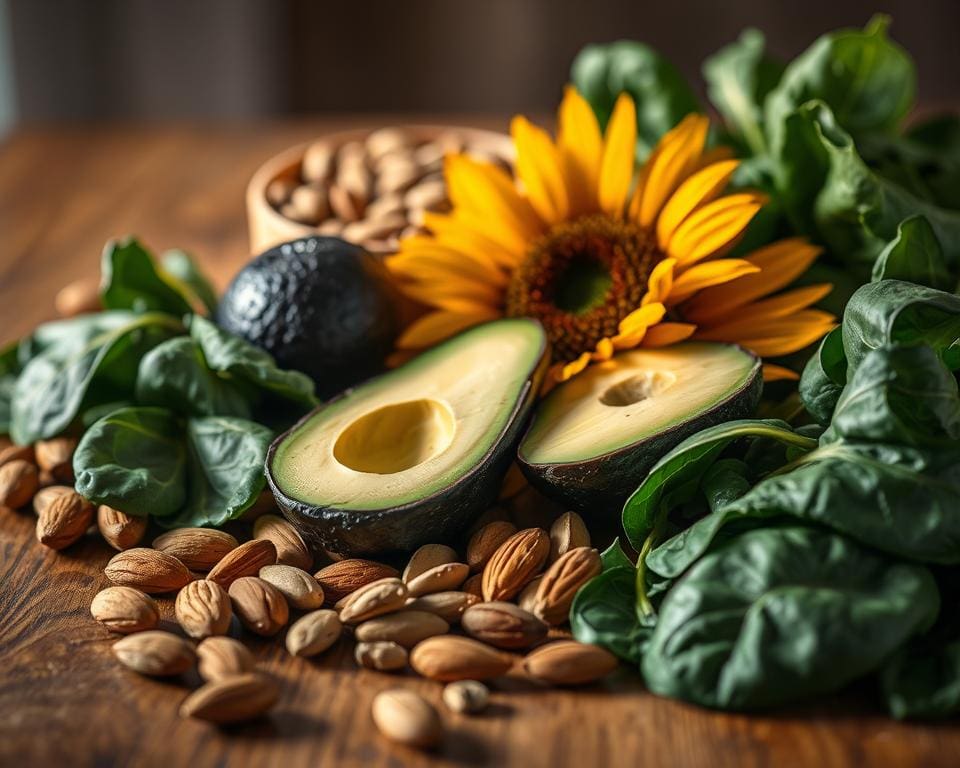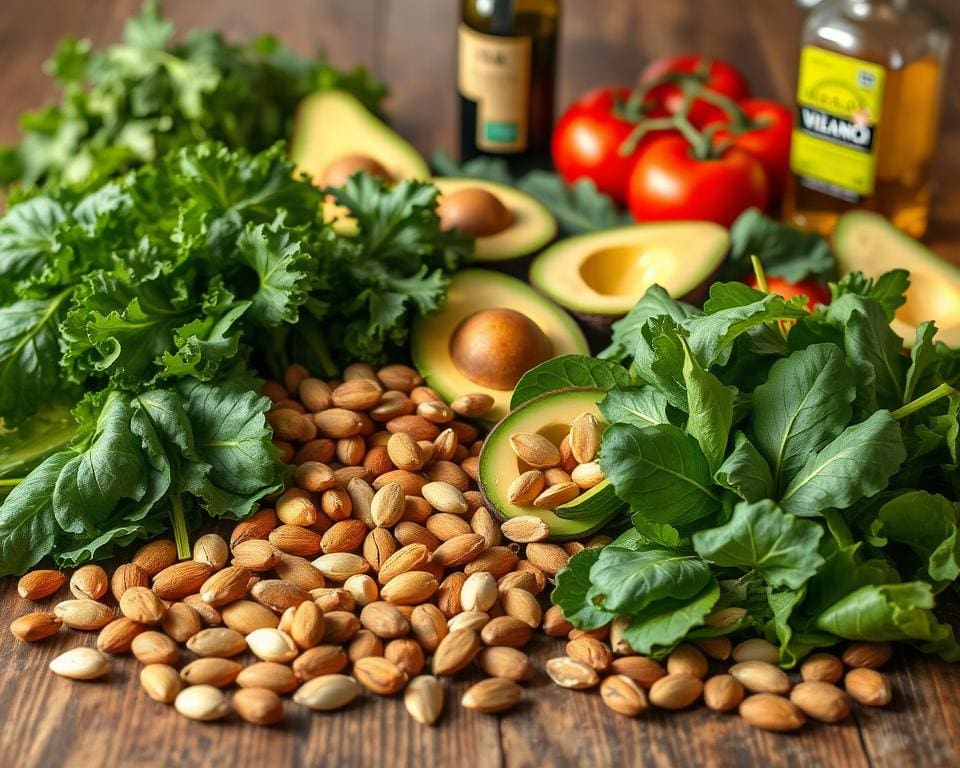Vitamin E plays a crucial role in maintaining overall health and wellbeing, acting as a powerful antioxidant that protects cells from damage. As we explore the topic of what foods are rich in vitamin E, it becomes evident that incorporating vitamin E-rich foods into your diet can significantly enhance your nutrient intake. Not only does vitamin E support immune function, but it is also essential for skin health, making it a vital component of a balanced diet. Understanding the sources of vitamin E can lead you to discover delicious and nutritious options that elevate your health.
Understanding Vitamin E and Its Benefits
Exploring the world of nutrition unveils an essential nutrient that plays a significant role in maintaining health—vitamin E. With its unique properties, this vitamin is paramount for various bodily functions and well-being.
What is Vitamin E?
Vitamin E is a fat-soluble vitamin known primarily for its antioxidant characteristics. It exists in several forms, with alpha-tocopherol being the most prevalent and biologically active in humans. This vitamin is crucial for protecting cells from oxidative stress, helping to maintain overall health and vitality.
Health Benefits of Vitamin E
This extraordinary vitamin is not only vital for immune function but also supports skin health, eye health, and cardiovascular wellness. The vitamin E description highlights its role in preventing inflammation and reducing the risk of chronic diseases. Emphasising its potential benefits, studies suggest that adequate intake of vitamin E contributes to healthier skin and may even improve skin texture.

What Foods Are Rich In Vitamin E
Vitamin E plays a crucial role in maintaining good health, acting as a powerful antioxidant. Identifying the right sources can greatly enhance your diet, ensuring you receive adequate amounts of this essential nutrient. Below, an exploration of various foods rich in vitamin E helps to guide your choices.
Top Sources of Vitamin E
Incorporating top vitamin E foods into your meals not only adds flavour but also boosts nutritional value. Some prime examples of vitamin E food sources include:
- Almonds – Known for their high vitamin E content, these nuts are perfect as a snack or added to salads.
- Sunflower seeds – Packed with nutrients, they make excellent toppings for yoghurt or oatmeal.
- Hazelnuts – Their rich flavour complements many dishes, offering a delightful crunch.
- Spinach – This leafy green contributes substantial amounts of vitamin E and can easily blend into smoothies.
- Broccoli – A versatile vegetable, it stands out as an excellent source of vitamin E, perfect for steaming or stir-frying.
How Much Vitamin E Do You Need?
The recommended daily intake of vitamin E varies by age and health status. Generally, adults require around 15 milligrams per day. Incorporating a variety of top vitamin E foods helps ensure you meet these daily needs while enjoying a diverse and wholesome diet.
Vitamin E-Rich Foods to Include in Your Diet
Incorporating vitamin E-rich foods into your daily meals can significantly enhance your overall nutrition. Among the various sources of this essential nutrient, nuts and seeds stand out as particularly rich options. They not only provide a healthy dose of vitamin E but also contribute other beneficial nutrients, making them a valuable addition to any diet.
Nuts and Seeds
Nuts and seeds are known for being nuts high in vitamin E. Almonds, in particular, are a powerhouse of this vitamin, delivering more than half of the recommended daily intake in just a handful. Sunflower seeds also boast impressive levels of vitamin E, alongside healthy fats that promote heart health.
- Almonds: A fantastic source of vitamin E, perfect as a snack or in salads.
- Sunflower Seeds: These tiny gems are packed with nutrients and can easily be added to meals.
- Pine Nuts: High in vitamin E and ideal for pesto or as a topping on dishes.
Vegetable Oils
Beyond nuts and seeds, several vegetable oils serve as excellent seeds vitamin E sources. Oils such as wheat germ and sunflower are amongst the richest, enabling you to add a healthy touch to your cooking.
Fruits and Vegetables
Many fruits and vegetables also provide significant amounts of vitamin E. Avocado and spinach not only add variety to your diet, but they also contribute beneficial antioxidants that can help protect your body.
How to Incorporate Vitamin E Foods into Your Meals
Integrating vitamin E foods into your daily menu can be both enjoyable and straightforward. Simple vitamin E recipes allow you to boost your nutritional intake without sacrificing flavour. With a variety of options available, you can cater to different tastes and preferences.
Simple Recipes for a Vitamin E Boost
One delightful way to enhance your meals is by experimenting with nut-based salads. Combining spinach, almonds, and pomegranate seeds creates a vibrant dish packed with flavour and nutrients. For a quick smoothie, blend spinach with avocado and your choice of milk for a creamy, nutrient-rich drink. This concoction is excellent for a morning boost or a post-workout refreshment.
Snack Ideas High in Vitamin E
Snack time can transform into a nutritious experience through careful selections. Homemade granola bars featuring sunflower seeds, dried fruits, and oats are a handy option for those on the go. Alternatively, roasted chickpeas seasoned with spices make for a crunchy yet healthy snack. Incorporating these ideas into your routine showcases cooking with vitamin E foods as delicious and accessible.
Shopping for Vitamin E Food Sources
When embarking on your vitamin E shopping guide, the first step is to focus on selecting high-quality nuts and seeds. Look for options such as almonds, hazelnuts, and sunflower seeds, as these are rich sources of vitamin E. When buying vitamin E foods, opt for raw or dry-roasted varieties without added sugars or salt. This ensures that you are not only getting the essential nutrients but also minimising unnecessary additives that can detract from your health goals.
In the vegetable oil aisle, choosing oils like sunflower, safflower, or olive can also help you boost your vitamin E intake. Always check the labels for the purification processes; going for organic and minimally processed oils is a wise choice. This practice can significantly preserve the nutrient content, providing maximum health benefits.
Lastly, as you shop for fruits and vegetables, consider incorporating avocados, spinach, and broccoli into your cart. Understanding what to look for in fresh produce can enhance your dietary choices. By being mindful and informed while shopping, you can easily develop a routine that integrates healthy vitamin E sources into your daily meals, benefiting your overall wellness.









